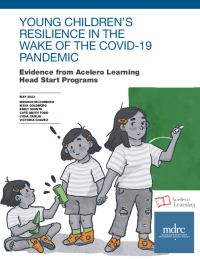Young Children's Resilience in the Wake of the COVID-19 Pandemic
Evidence from Acelero Learning Head Start Programs

There is clear evidence that the COVID-19 pandemic had significant negative effects on the learning and development of school-age children in the United States, with disproportionate impacts on children from racially, ethnically, and socioeconomically marginalized groups. There is less consistent evidence, however, on the extent to which the pandemic affected younger, preschool-age children. Very little systematic data has been collected on 3- and 4-year-olds over the last three years. There is a clear need for better information on the academic and cognitive development of the country’s youngest learners—particularly those from marginalized groups—in the wake of the pandemic.
In 2021, MDRC and Head Start-grantee Acelero Learning began a research-practice partnership in part to address this need. Acelero Learning operates dozens of Head Start centers serving children in four delegate sites across the country: Camden, NJ/Philadelphia, PA; Monmouth/Middlesex Counties, NJ; Milwaukee/Racine, WI; and Clark County, NV. Working with MDRC, Acelero Learning identified a need to better understand whether children in its programs were exhibiting resilience during the pandemic recovery. That is, were children’s assessment scores across a variety of domains similar to or better than those of demographically similar populations of children attending Head Start before the crisis? This brief aims to answer that question and to build further research on the development of young children. It summarizes the initial results from a study led by MDRC that is examining post-pandemic language, literacy, math, and executive functioning skills of children enrolled in Acelero Learning programs.






